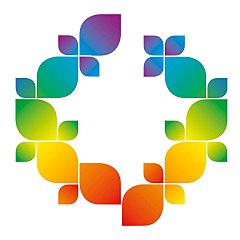This is the history of Croatia since the end of the Croatian War of Independence.
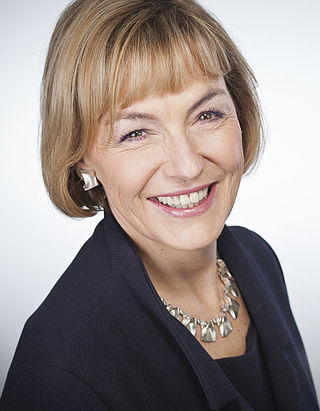
Vesna Pusić is a Croatian sociologist and politician who served as First Deputy Prime Minister and Minister of Foreign and European Affairs in the centre-left cabinet of Zoran Milanović. She was Croatia's second female Foreign Minister taking the office after Kolinda Grabar-Kitarović. She is known as an outspoken liberal and an advocate of European integration, anti-fascism, gender equality and LGBT rights.
The Hrvatska nogometna liga, abbreviated as HNL and also known for sponsorship reasons as the SuperSport HNL, is the top Croatian professional football league competition, established in 1992. It was previously called Prva Hrvatska nogometna liga, but a league structure reorganization from 2022–23 led to name changes for the three top league levels.
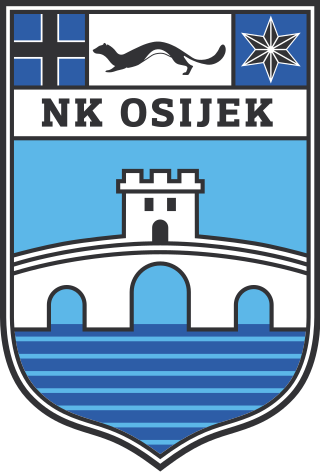
Nogometni klub Osijek, commonly referred to as NK Osijek, is a Croatian professional football club from Osijek. Founded in 1947, it was the club from Slavonia with the most seasons in the Yugoslav First League and, after the independence of Croatia in 1992, it is one of the four clubs that have never been relegated from the Croatian First League, the others being Dinamo Zagreb, Hajduk Split and Rijeka.

Croatia recognizes life partnerships for same-sex couples through the Life Partnership Act, making same-sex couples equal to married couples in almost all of its aspects. The Act also recognizes and defines unregistered same-sex relationships as informal life partners, thus making them equal to registered life partnerships after they have been cohabiting for a minimum of 3 years. Croatia first recognized same-sex couples in 2003 through a law on unregistered same-sex unions, which was later replaced by the Life Partnership Act. The Croatian Parliament passed the new law on 15 July 2014, taking effect in two stages. Following a 2013 referendum, the Constitution of Croatia has limited marriage to opposite-sex couples.

Lesbian, gay, bisexual, and transgender (LGBT) rights in Croatia have expanded since the turn of the 21st century, especially in the 2010s and 2020s. However, LGBT people still face some legal challenges not experienced by non-LGBTQ residents. The status of same-sex relationships was first formally recognized in 2003 under a law dealing with unregistered cohabitations. As a result of a 2013 referendum, the Constitution of Croatia defines marriage solely as a union between a woman and man, effectively prohibiting same-sex marriage. Since the introduction of the Life Partnership Act in 2014, same-sex couples have effectively enjoyed rights equal to heterosexual married couples in almost all of its aspects, except adoption. In 2022, a final court judgement allowed same-sex adoption under the same conditions as for mixed-sex couples. Same-sex couples in Croatia can also apply for foster care since 2020. Croatian law forbids all discrimination on the grounds of sexual orientation, gender identity, and gender expression in all civil and state matters; any such identity is considered a private matter, and such information gathering for any purpose is forbidden as well.

The Croatian National Theatre in Zagreb, commonly referred to as HNK Zagreb, is a theatre, opera and ballet house located in Zagreb.

Kraš is a Croatian food company based in Zagreb, specializing in confectionery products. In 2012, Kraš was, after Podravka, the second largest Croatian exporter of food.
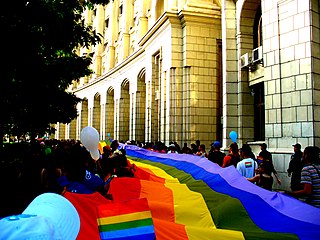
Bucharest Pride, known previously as GayFest, is the annual festival dedicated to LGBT rights in Romania, taking place in Bucharest for nearly a week. Current event organizer is Kyle David Kipp. It first took place in 2004 and now occurs in May–June of each year, culminating with the March of Diversity. It is organised by the non-profit organisation ACCEPT, the country's largest lesbian, gay, bisexual and transgender (LGBT) rights organisation. The festival also receives funding from the Romanian Ministry of Health and the National Council for Combating Discrimination, as well as a number of private organisations, such as the Open Society Institute and the British Council in Romania.

Zagreb Pride is the annual LGBTIQ+ pride march in the city of Zagreb, Croatia, which first took place in 2002, as the first successful pride march in Southeast Europe. Zagreb Pride organizers say their work was inspired by the Stonewall Riots and the Gay Liberation Front. It is self-identified as LGBTIQ+ march and therefore in 2003 changed its name from Gay Pride Zagreb into Zagreb Pride. The Pride was organized by a volunteer-based and grass-roots Organizing Committee that was formed each year. A new organization founded in 2008 as a non-governmental organization Zagreb Pride that also registered the use of the name as a brand. The organization is a member of InterPride, EPOA, IGLYO, ILGA-Europe and in 2010, together with Lesbian Organization LORI and Domino, it was the founding member of Croatian first national LGBT association, Center for LGBT Equality. Pride receives funding from the City of Zagreb and a number of international human rights organizations and embassies.

Zoran Milanović is a Croatian politician serving as the president of Croatia since 2020. Prior to assuming the presidency, he was prime minister of Croatia from 2011 to 2016, as well as president of the Social Democratic Party (SDP) from 2007 to 2016.
Konzum is Croatia's largest supermarket chain, with over 700 stores throughout the country and more than 10,000 employees. Konzum serves over 650,000 customers each day. With its headquarters in Zagreb, Konzum is part of the Fortenova Group since 1 April 2019.

Croatia and Greece established diplomatic relations on July 20, 1992. Since November 1994, Greece has an embassy in Zagreb. Croatia has an embassy in Athens. The relations between Croatia and Greece have been regarded as excellent with a high cooperation between the two countries on the economic, touristic and political aspect. Greece was a key supporter during the accession process of Croatia to the European Union. Both countries are full members of the European Union, NATO and of the Council of Europe.

Macedonians in Croatia refers to the group of ethnic Macedonians who reside in Croatia. According to the official census of 2011, there are 4,138 ethnic Macedonians in Croatia.

Croatia and Iran established diplomatic relations on April 18, 1992 when Iran became the 7th country in the world and the first among Asian and Muslim-majority countries to recognize the newly independent Croatia. Croatia has an embassy in Tehran while Iran has an embassy and a cultural center in Zagreb. Relations among two countries are described as good and friendly.

Sofia Pride Parade is a peaceful march of LGBT people and their relatives and friends, which combines social and political protest with entertainment such as live concerts. It takes place every year in the month of June in Bulgaria's capital Sofia since 2008. The first Sofia Pride parade was held on June 28, 2008, on the same date as the Stonewall riots in New York City that occurred in 1969. Same-sex sexual activity became legal on May 1, 1968. Between 1968 and the collapse of communism in 1989, no publicly gay movements nor places of social gatherings existed. After democracy was established in 1990, several gay bars and clubs opened doors in the capital of Sofia as well as in Varna and Plovdiv.
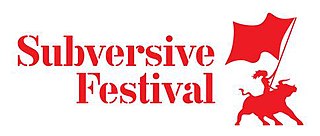
The Subversive Festival is an annual international fortnight of political, activist, cultural, educational, literary and artistic events that takes place in Zagreb, Croatia every May. Its activities are divided into the Subversive Film Festival, the Subversive Forum, the Balkan Forum and the Subversive Book Fair. The cross-cutting activity is the Subversive Festival's Conference that includes major keynote lectures and round tables held in Cinema Europe.

The Anti-Cyrillic protests in Croatia were a series of serbophobic protests in late 2013 against the application of bilingualism in Vukovar, whereby Serbian and the Serbian Cyrillic alphabet were assigned co-official status due to the local minority population. The implementation of this decision became mandatory after the 2011 Croatian census, according to which Serbs in Vukovar comprise more than one-third (34.8%) of Vukovar's total population. Signs in the Serbian Cyrillic alphabet had been put up as the Constitutional Act on the Rights of National Minorities mandates bilingual signs in any area where more than one-third of the population belongs to an ethnic minority. This decision became subject of intense agitation by, among others, Croatian war veterans and many ordinary citizens who believe that due to events, particularly the Battle of Vukovar, the city should have been excluded from the application of the law on minority rights, although protests and vandalism have occurred in other towns and cities. The Serbs of Croatia are a minority group that have the narrowest usage of right to bilingualism among all national minorities in Croatia.

Osijek Pride is an LGBT pride march in the Croatian city of Osijek. Osijek is the third city in Croatia to get its LGBT pride, after Zagreb (2002) and Split (2011). The first Osijek Pride took place on 6 September 2014. Approximately 200 participants marched through the city center, accompanied by about 100 police officers, though their intervention was not needed. Concerns about possible disturbances from the football fan group "Kohorta" proved unfounded, as did calls for the city to be empty during the Pride. Notable attendees included Croatia's Minister of Economy, Ivan Vrdoljak, a native of Osijek, who expressed his support for the Pride and emphasized the importance of tolerance and understanding for the future. The event featured banners with messages advocating for LGBT rights and acceptance, such as "Inati se Slavonijo", "Homophobes, stay in your four walls," and "Why do you disown your own child?"

Equality March in Kraków, known as the Tolerance March before 2010, is an annual demonstration in Kraków, Poland, in the form of a street march of people opposed to homophobia and discrimination against sexual minorities in Poland.
